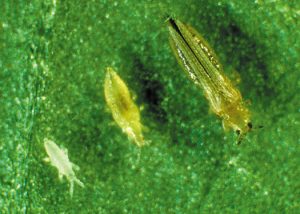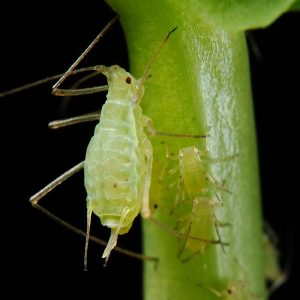Houseplant pests can be some of the most overlooked pests that infest homes. Though they are often underestimated, these insects can cause serious harm to your beloved plants. To best combat houseplant pests, prevention is the key.
Methods for Preventing Houseplant Pests Infestation
Regardless of who you are or where you live, pests can infest your plants. They care very little about anything but finding a suitable habitat in which they can eat, grow, and thrive. Follow the suggestions below to prevent pests like aphids or mealybugs from infesting your plants whether they are within your home or greenhouse.
- When purchasing plants, check them thoroughly to ensure they are bug-free. Also, purchase household plants from reputable sources to lessen your risk of infestation.
- Keep new plants separated from other household plants for at least 30 days. During this period, you’ll be able to check for any pests that may be present, especially those that may not be detectable at first

Thrips are common houseplant pests
glance. Ensure you do not place new plants in the vicinity of older ones until you are certain that no pests are present.
- Always wash equipment when you tend to your plants to avoid cross-contamination, even in cases where no signs of an infestation are present. This is very important since some houseplant pests are microscopic and can easily infest nearby plants as well, if left untreated.
- Check plants regularly for signs of infestation. Some pests, for example spider mites, are extremely small, making it very difficult to detect their presence. Since infestation may be hard to spot early on, check for signs of webbing, damaged leaves, wilting, mold or any other evidence of pests being present on a regular basis. If you notice any signs of infestation, isolate that plant until the problem is under control.
Best Ways to Control Houseplant Infestation
But what if you spot signs of infestation, for instance, clusters of sap-sucking aphids on your plants? What do you do then?
Once an infestation occurs, homeowners will need to act immediately to control the spread of these insects. The best control methods often involve non-chemical procedures since they are less likely to damage plants.
- Remove bugs by hand. Handpicking bugs may not sound like fun, but it is a sure way to get rid of many of the larger houseplant pests. These include mealybugs or slugs. If the insects are very numerous, however, removal by hand may not be a practical solution.
- Use DIY insecticide spray. This is another effective, non-chemical method. It involves the use of a detergent solution, for instance, you can add one-part dishwashing soap to ten parts water. Pour solution in a spray bottle then spray solution onto leaves, stems, and other areas of the plants that are infested. This will soften any residue that the bugs may leave on the plants and make the bugs easier to remove as well. Once

Aphids
you’ve sprayed the plants, use a soft cloth to remove bugs and clean away residue from plants.
- Prune plants. Pruning is another effective method. Simply clip away leaves and other sections of the plant that are infested with houseplant pests. This will prevent further infestation from occurring.
- Use alcohol and cotton balls. If your plants are suffering from infestation due to aphids or mites, alcohol and a few balls of cotton may prove useful. Simply dip the cotton balls in alcohol and use them to swab at affected areas.
- Use high-pressure spray. Some garden supply stores sell high-pressure sprays which are perfect for controlling plant pests. These should be powerful enough to get rid of insects residing on leaves and stems while mild enough to cause no damage to the plant itself.
- Remove infested plants from home. In cases where the houseplant infestation is severe, the best option may be to simply discard plants which are heavily infested. Though this may be a difficult decision, it may be the best choice as it can prevent unaffected plants from becoming infested.
Solutions that involve the use of chemicals should only be considered after non-chemical methods have been exhausted. If you decide to use insecticides, also ensure you get help from a pest control specialist who is certified and fully equipped to solve the problems you face.

No Comments